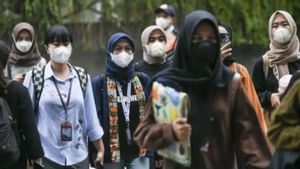JAKARAT - The COVID-19 pandemic has not ended, but another threat in the health sector has returned. There is one more virus that is feared could cause a new pandemic.
This virus is named Nipah and is found in Southeast Asia. Quoting the official website of the World Health Organization (WHO), this virus has fast and deadly transmission ability.
Nipah is not actually a new virus. This virus was first discovered in 1999 in Malaysia. The death rate caused by the nipah virus reaches 40 to 75 percent.
Based on WHO data, the spread of this virus involves fruit bats and pigs. There is no vaccine to deal with this virus.
The methods that can be used to prevent the transmission of the nipah virus at this time are raising awareness about the risks of the nipah virus and informing about measures to minimize exposure.
This virus can be transmitted from animals to humans and contaminated food. Can also be transmitted from human to human. Various effects can occur due to this virus exposure to humans, from asymptomatic (subclinical) infections to acute respiratory disease and encephalitis.
In the case that occurred in Singapore — after Malaysia was affected — most of the infections in humans were caused by direct contact between humans and sick pigs or their contaminated tissue.
According to WHO's explanation, transmission is thought to be due to exposure to pig secretions or after direct contact with unprotected sick animals.
Apart from Singapore, other cases that have occurred is in Bangladesh and India. WHO states that consumption of fruits or their processed products (for example, raw date juice) which is exposed to the saliva or urine of infected fruit bats makes such exposure possible.
Therefore, one of the things that can be done to prevent transmission is to minimize direct contact with sick animals, especially pigs. If forced to make contact, use protective equipment.
WHO also said that intensive supportive treatment is the recommended treatment to cure severe respiratory and neurological complications.
The English, Chinese, Japanese, Arabic, and French versions are automatically generated by the AI. So there may still be inaccuracies in translating, please always see Indonesian as our main language. (system supported by DigitalSiber.id)













